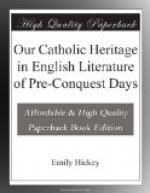Hac sunt in fossa
Bedae Venerabilis ossa.
“In this grave are the bones of Venerable Bede.” We know the old story how the pupil who was writing his dear master’s epitaph could not find the right word, as it has happened to many a one for the time being; and how he slept and awoke to find the word supplied by the gracious angel hand.
In his Benedictine cell at Jarrow, St Bede read and thought and wrote; and all that he wrote was done in noble sincerity of purpose, springing from the dedication of his whole soul to Him who is truth itself. He told as history what he believed to be true, and collected his materials from sources acknowledged to be trustworthy; and he is always careful to tell us when he gives a story on evidence only hearsay.
St Bede refused to be Abbot of Jarrow, because “the office demands household care, and household care brings with it distraction of mind, which hinders the pursuit of learning.”
He wrote many things, and it has been said that his writings form nearly a complete encyclopaedia of the knowledge of his day; but the work of St Bede by which he is best known is the “Church History of the English Race.” It is of greater value than we can tell, and has been used for many generations for knowledge and help.
The history of England was in St Bede’s time inseparable from the history of her Church, as we pray that one day it may again come to be.
The book begins with a short account of Britain before the coming of St Augustine. St Bede used old writers for this, and he was much helped by two of his friends, Albinus and Northelm. Northelm used to make researches for him at Rome, and brought him copies of letters written by St Gregory the Great, and other Popes, bearing on the Church history of Britain. From other sources also he took the information which has come down through him to us, a heritage for which we cannot be too grateful. Our two great early histories are the “Anglo-Saxon Chronicle,” and Bede’s “Church History of the English Race.” Without these, what could our historians have done?
This great book of St Bede’s was, like almost all his work, written in Latin; the grand old tongue in which our priests say their daily Office and minister at God’s altar. It was King Alfred who gave us a free translation of it in English. But although it was written in Latin, it belongs absolutely to our Catholic Heritage in English Literature.
Bede was the first historian to date from the Incarnation of Our Lord, the form which we have always used. The History comes down to A.D. 731, a short time before its author went to his rest. We can never think of St Bede as a mere bookman, a purely “literary man.” His own character, truth-loving, wise, devoted, cheerful, has been felt through his work; a character that has made people love him and stretch out hands of affection to him across the heaping-up of the years. How glad are we to say, we, students, workers, all of us, “St Bede, pray for us.”




